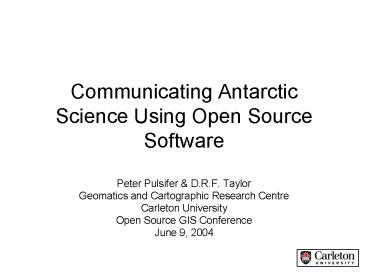Communicating Antarctic Science Using Open Source Software - PowerPoint PPT Presentation
Title:
Communicating Antarctic Science Using Open Source Software
Description:
Communicating Antarctic Science Using Open Source Software. Peter ... Haptic. Geographic. Database - PostGIS - ArcSDE. Geo-files .sdts .shp. Sensor -sensorML ... – PowerPoint PPT presentation
Number of Views:39
Avg rating:3.0/5.0
Title: Communicating Antarctic Science Using Open Source Software
1
Communicating Antarctic Science Using Open Source
Software
- Peter Pulsifer D.R.F. Taylor
- Geomatics and Cartographic Research Centre
- Carleton University
- Open Source GIS Conference
- June 9, 2004
2
Presentation Overview
- The Cybercartographic Atlas of Antarctica Project
- Atlas Content
- Partnerships
- System Architecture
- Conclusion
3
The Cybercartographic Atlas of Antarctica Project
4
Project History
- First proposed by Dr. Daniel Vergani of Argentina
- Formally adopted by SCAR in Sienna, 2001
- Three workshops held to date
- Puerto Madryn, December 2001
- Ottawa, May 2002
- Ottawa, October 2003
5
Cybercartography
- Multisensory
- Multimedia
- Interactive
- Information/analytical package
- Produced by interdisciplinary teams
- Forms new partnerships
- Applied to a wide variety of subjects
- Taylor, 2003
6
Goals of the Atlas
- Atlas Goals
- Create an innovative new product and methodology
to compliment discovering, utilizing, presenting
and distributing existing information and data
about Antarctica to a wide variety of users,
including scientists, decision makers and the
general public - Facilitate increased cooperation and information
exchange between Antarctic stakeholders under the
terms of the Antarctic treaty - Through international cooperation, to develop and
link National Atlases of Antarctica
7
Atlas Users
- General public
- Learn from theme specific synthesis of data on
Antarctica - Policy makers
- Integrate and analyse geographic information to
support policy decisions (Cordnonnery, 1999) - Scientists
- Integrate and analyse geographic information
using scientific visualization to support
information discovery and knowledge generation
8
Atlas Content
9
Atlas Volumes and Themes
- Volume 1 Antarctica in a Global Context
- The Antarctic Ice Sheet Implications of Global
Climate Change - Volume 2 The Continent of Antarctica
- McMurdo Dry Valleys
- Volume 3 Antarctic Science
- Geoscience Subglacial Antarctic Lake Exploration
- Volume 4 Human Activity in Antarctica
- Tourism in Antarctica
10
Maps
On-Line Services
Digital Raster Graphics
11
Satellite Images
IceSat
LandSat
RadarSat
12
Aerial Photography
Hope Bay, Antarctic Peninsula. Compliments
U.S. Geological Survey
13
DEMs / Shaded Relief Maps
Source http//www.maps.ethz.ch
Mount Erebus, Ross Sea
14
Text
15
Images cont.
16
Process Animations
Folding of the Earths Crust
Movement of the Earths Tectonic Plates Over
Geologic Time Scale
17
Time Series Animation
18
Video
19
Partnerships
20
Users
User / Providers
Providers
21
Data Infrastructure
Hub
Node
Data, Metadata, Semantics
22
System Architecture
23
CAAP Conceptual Framework
Interface
General Public
Scientists
Policy Makers
Mediator
Data Infrastructure
24
General Service Architecture
User
Interface
Application (atlas)
Portrayal (map renderer)
Mediator
Processing (modeling software)
Registry (metadata catalog)
Data (feature service)
Infrastructure
Service (example)
25
ltcatalog servicegt ltregistry servicegt
ltportrayal servicegt ltprocessing servicegt ltdata
servicegt
The Atlas
Atlas Hub
SCAR Partners
SCAR/External Partners
26
Example of Partner OGC Data Services for The Atlas
ResponseGML/ IML
Request http
27
(Pulsifer, 2004)
28
(Pulsifer, 2004)
29
Infrastructure
- Data and Registry Services
- Open source object relational database (PostGIS)
central to infrastructure - WMS, WFS, WCS (Mapserver)
- Catalog service (deegree)
- Sensor Collection Service using SensorML (GML)
- Gazetteer (deegree)
- Standardized feature model under development
- Semantics - future will see open standards formal
ontology used by mediator level
30
(Pulsifer, 2004)
31
Geographic Mediation
- Processing Services
- Coordinate transformation (Proj4)
- Geofusion (development project, OGC)
- Semantic Translation (RDF, DAMLOIL)
- Image classification (GRASS)
- Advanced modelling (GRASS, PostGIS)
32
Cartographic Mediation
- Portrayal services
- Map (Mapserver)
- Coverage (Mapserver)
- Terrain (deegree)
- Multi-media / multi-modal (Apache, others)
33
(Pulsifer, 2004)
34
Interface
- Rendering Applications
- HTML, JavaScript (Apache, Mapserver)
- SVG (Mapserver experimental)
- Flash (Mapserver Flash experimental)
- 3D/4D rendering (TBD i.e. NVIZ 3D)
35
Architecture Summary
- Developed to support multimedia cartography based
on a Spatial Data Infrastructure model - Modular design intended to provide flexibility,
scalability - Based on open standards (i.e. OGC)
- Uses (but not limited to) open source software
36
Conclusion
- Cybercartographic Atlas of Antartica aims to
communicate Antarctic science using multi-media
cartography - System based on distributed knowledge and data
- Open source technologies have facilitated the
development of a flexible system that can be
shared among stakeholders
37
Acknowledgement
- The Author acknowledges the support of the
Initiatives on the New Economy program of the
Social Sciences and Humanities Research Council
of Canada






























